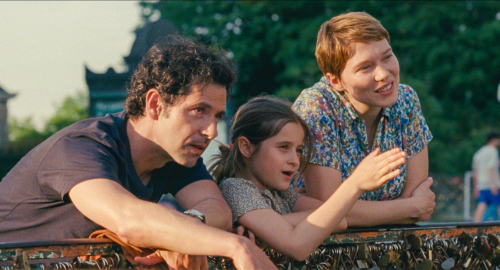
Carole Bethuel/Sony Pictures Classics
MOVIE REVIEW
One Fine Morning (2022)
Pity the poor Parisian bourgeois bohemian, whose lives are full of nothing but booklined apartments, interesting careers and family nearby. Pity harder the daughters of elderly Parisian intellectuals, who must put their freelance work and artistic endeavors on pause when their daddies develop the cinematic version of old age and infirmity that requires only the most mild care. But pity the most the Parisian boyfriends of these Parisian daughters, who must provide emotional support to these women instead of just getting to cheat on their wives scot-free. This low-stakes emotional merry-go-round so beloved of French cinema can be both relaxing and irritating to watch, and as shown at the Toronto International Film Festival “One Fine Morning” breaks no new ground. At least everything is beautifully and expertly done. If you like this sort of thing, you’ll love it.
Sandra (Léa Seydoux) is an interpreter with a 9-year-old daughter, Linn (Camille Leban Martins). She was widowed some time ago and in case we don’t understand she has given up on her sexuality, she dresses like a 9-year-old boy, in boxy t-shirts and loose-fitting jeans, carrying a backpack instead of a designer handbag. Old age is catching up with her father Georg (Pascal Greggory). As he can no longer live unassisted, a suitable nursing home must be found and his apartment sold. Fortunately his ex-wife, Sandra’s mother Françoise (Nicole Garcia), has no life of her own apart from some mild environmental advocacy so is happy to take the lead on this, despite Georg having his own long-term partner, Leila (Fejria Deliba). This means Sandra is free to focus on Clément (Melvil Poupaud), an old friend from university she bumps into for the first time in years. He has a son Linn’s age and spends most of his time working in Antarctica, studying rocks. There’s a recurring joke about his precise job title. He’s married so there’s no subtext when he invites Sandra to his office to show her his mass spectrometer. Of course there isn’t. These people are French. What could they possibly do?
Well. Clément does it so well that on their first joint public outing Sandra wears a low-cut red sundress (costume designer Judith de Luze with the least subtle subtext of the year there). Linn is delighted to have Clément around – she doesn’t mention her lost father at all, nor throw any temper tantrums about suddenly losing her mother’s undivided attention, although she does at least try to fake a leg injury convincingly enough that Sandra takes her to the doctor. Everyone’s clothes are very well ironed. There’s a lot of harpsichord music in the background. Sandra becomes so swept up in her feelings for Clément that she starts being a little bit bad at her job, not that there are any consequences for that. As Georg cycles through various slightly problematic old folks’ homes, Sandra’s overwhelming caring responsibilities consist of the occasional chat with her mother about Georg’s library. At one point she even tells Linn that she is closer to her father’s books than she is with him.
If writer-director Mia Hansen-Løve had a specific point she was trying to make, she did it so gently that all dramatic urgency was lost. If she wanted us to join hands and sing “The Circle of Life” as Sandra finds new love just as her father Georg starts to die, there ought to be a little more at stake here than who gets a multilingual collection of old philosophy books (spoiler: a former student of his approaches Sandra on the street and says she’d be honored to have a memento of her favorite teacher, so the family happily dump most of them on her). Perhaps this is unfair; Ms. Hansen-Løve specializes in realistic depictions of the minor struggles of minor artists without being a minor artist herself, but it’s just not very interesting when the main obstacle in someone’s life is someone else’s wife we never get to see. The reality of course is that all this agreeable behavior and mature discussion are papering over some horrible truths. Clément is betraying his wife and child every time he spends a pleasant afternoon with Sandra and Linn; Georg is losing the part of his body – his mind – which he valued the most and is alone with strangers while this is happening; Sandra’s first sexual activity since her husband’s death has her like a giddy virgin instead of a financially independent woman living one of the world’s most sophisticated lives. Why on earth were none of those problems dialed up to 11? If Françoise insisted Sandra and her sister Elodie (a bitterly underused Sarah Le Picard) took on the caring responsibilities, forcing Sandra to spend her time with the miserable Georg instead of the delightful Clément, we might have had some actual conflict here. Instead it’s all desperately polite. Even the insult about “Frozen 2” is lightly done. Though say what you will about Disney movies, they know what it means to lose your parents.
Comments